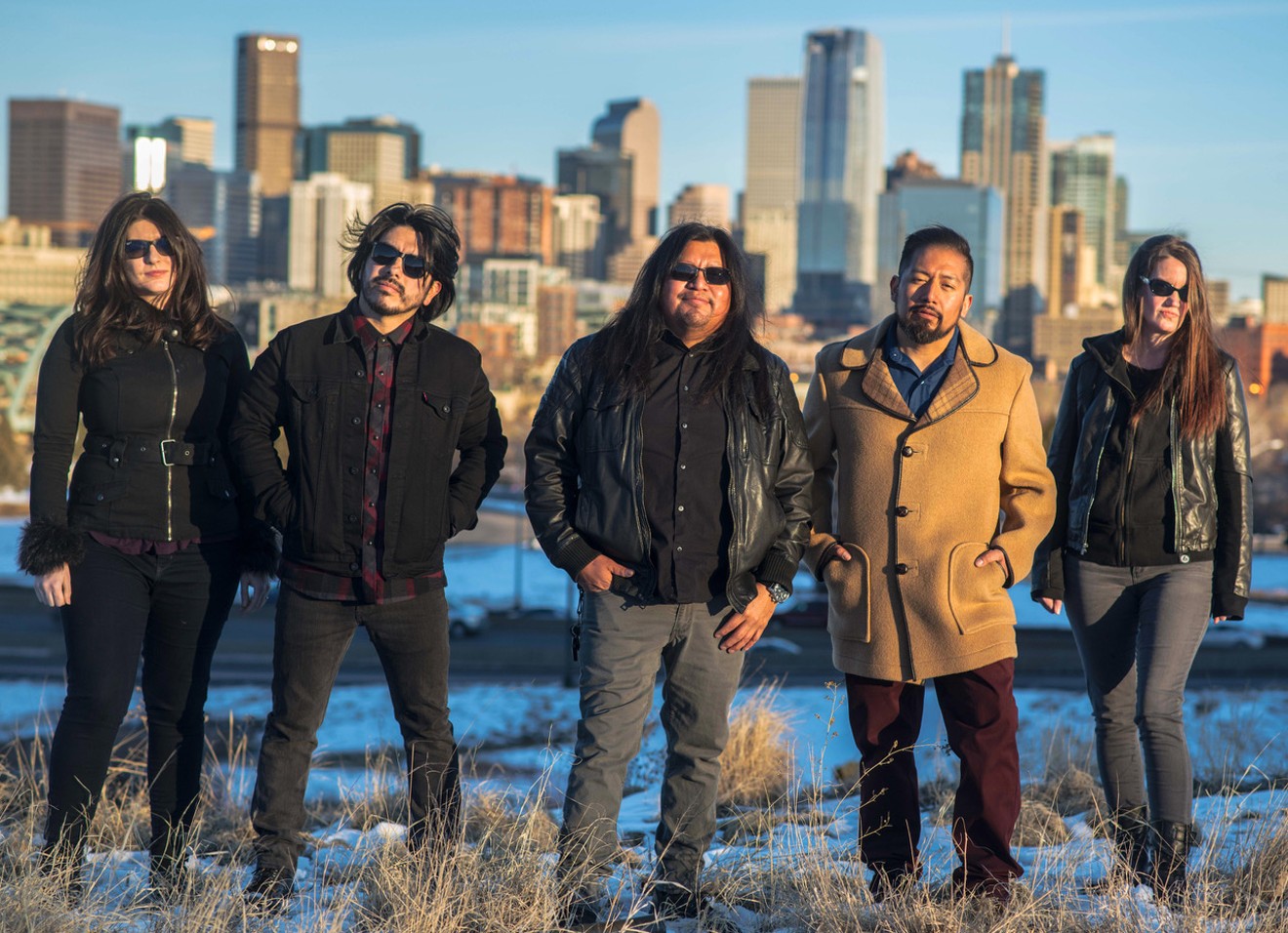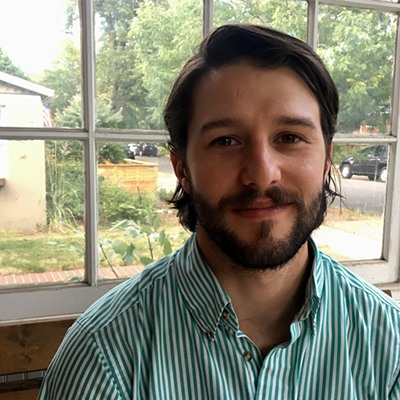Following its 2014 debut record, Epoca de Bestias, the members of Denver electronic post-rock trio Altas knew they needed to make foundational changes if they were going to write a better followup. A lack of structure in the songwriting process had proved to be an ill-suited long-term option, and something had to shift.
After working with musician Meaghan Lillis in the studio while recording Epoca, Altas brought her on as an official bandmember for sophomore effort All I Ever Wanted Was. Along with her stellar work as a pianist, Lillis helped provide structure to the band’s songwriting. The group also added bassist Amanda Krause to round things out, resulting in a second album that strikes a fine balance between traditional songwriting and experimental improvisation.
Ahead of the Altas album release show at Rhinoceropolis, Westword caught up with guitarist Enrique Jimenez to discus the new project.
Westword: Did the band do anything different during the writing and recording process of the new record?
Enrique Jimenez: I think we had a better understanding of what we were looking for, sound-wise. Because we’re an instrumental band, we typically focus a lot on all the instruments we're using and sounds that we’re creating, and how they weave into all the elements of the songs and different sections. We definitely were more purposeful in that regard, and definitely a little bit less heavy in terms of the compositions. A lot less riffing in places that we felt wasn't really necessary or [didn't] fit the song.
Why do you feel like that was the case? Why were you more purposeful?
I think that the reason the way it developed was we added a new member previous to this project. It was just the three of us: me [guitar], Juan Carlos Flores [guitar] and Israel Jimenez [drums]. We had a guest musician, Meaghan Lillis, come in for our last record to play piano, but after that, we continued playing shows with her, and she ended up having a lot of input on this new record. It’s definitely been a transition from just a lot of heavier riffing to more of a compositional element to the songs.
Walk me through a songwriting session for the band. Is it one big jam session?
Typically what ends up happening is one of the bandmembers will bring an idea to a session. We don’t really jam anymore. That’s really what the last record was about, in terms of how we wrote the songs. It was a lot of jamming, and that took a toll on us because there were no decisions being made with the songs in terms of the timeline. We were constantly changing the songs or doing small changes here and there.
But this one was a little bit more purposeful in its composition. Israel and Meaghan both have music degrees, so they kind of ground the compositional elements for myself and Juan Carlos. They kind of allowed us to experiment with what we do, and they brought us back down to these compositional elements and kept being consistent and purposeful with it, which definitely helped us finish the record in the way we envisioned it.
It sounds like Meaghan and Israel set a foundation for what you’re wanting to work toward, and then the band is tinkering from there, rather than just seeing what happens.
Correct. And the way we write the songs is really just how it ends up making us feel, section by section. We write them in sections depending on what kind of journey we want to take the listener through and how we want to make them feel and how it makes us feel.
After the debut record, did you naturally come to the conclusion that whatever you did next needed to be more focused and different?
I think we really all agreed that that was going to be the case. On the last record, that was a lot of what we learned, as far as the recording and writing process. Of course you’re always learning from what you’re doing in the studio, and luckily at that time we had quite a bit of time in the studio, so there was a bit more of a learned focus in terms of what we wanted to achieve in the studio. We just really knocked out this record and recorded it pretty quickly.
We didn’t really do that on our last record. We spent a lot of time in the studio, and we definitely didn’t get exactly what we were looking for. We were more purposeful in that regard and made sure that we did that on this record.
Do you feel like you got exactly what you wanted on this record? Close to it?
As close as possible [laughs]. There’s always going to be those little details where you go, "I could have done this or that," but, yeah. We definitely are very satisfied with what the end result is, and the folks over at Evergroove Studio, where we recorded this record, really helped facilitate all of that.
What did the band want to accomplish with this record?
There’s a couple things we were trying to accomplish. Number one was to come out with a product that we’re really satisfied with artistically. We really just wanted to make sure that we were satisfied with the record, to the extent that we can be.
We also wanted to progress the sound we had been working on a few years ago. I think we’ve gotten to a place where we have a very defined sound and want to continue to expand on that and bring it to new audiences and be very purposeful and strategic about it, as opposed to what we were doing prior to this record: playing show after show after show locally and on tour.
There was some disappointment in the reception of what we’re doing [with the last record], but there was a lot of those pockets of real intense appreciation for what we were doing. I think that’s what keeps motivating us to continue to create.
It's pretty interesting to compare All I Ever Wanted Was and Epoca de Bestias through the lens of how adding Meaghan and more structure to the songs changes the sound of the band.
For a time, there Israel was, on his own. Because he had all this knowledge that was difficult to communicate with us because we’re basically self-taught musicians. We live in this world where we don’t think about rules and things like that, which is kind of cool, but it can be frustrating for people who are used to structure in that sense.
I think that’s what propelled us a little further to get where we’re at now with our sound and be more deliberate with it.
As a self-taught musician, was it challenging to try to have more restraint and structure in the songwriting process?
Oh, yes, definitely. It was a little bit frustrating initially for communication, because there was a little bit of self-doubt for me, specifically, where I was always saying to myself, "Maybe you don’t understand these things because you’re not good enough," or things like that. Self-doubt creeps into everything, but specifically when you’re working with people who are way more educated than you are in that realm.
But at the same time, it kind of gave us a lot of focus toward the end on how to play in that sandbox, so to speak – of structure and experimentation and finding a good balance for it.
From your perspective, could you hear and feel that difference between beginning this new songwriting process and when the record was finished?
Oh, yeah. I mostly produced this record as well, so a lot of the sounds that were in the record had been agreed upon initially, but also there was a little bit of fine-tuning at the end as well. While in the studio, it sounded so good, and I was surprised by how much progress we had made and how much sonically we understood things — or at least I did, in terms of how we wanted things to sound together as opposed to just concentrating on my guitar part or just concentrating on the guitar sounds — although I obviously did that as well [laughs]. Overall I think it was a more polished piece.
It sounds like you have a new formula for future projects.
A little bit, yeah. I think there is sort of a formula, but we don’t want to get too stuck in that, because on this record, and the last record, we play with a little bit different sounds and rhythms than most post-rock instrumental bands.
It’s typically very dynamic: soft and loud, soft and loud. For post-rock bands, typically they’re really technical and jam-y, so we try to bring in different elements from musical influences of our own. Each person in this band is so different in their musical interests, it kind of brings all these elements together.
You’ll hear Latin American rhythms, you’ll hear different things that pull influence from R&B and hip-hop. This record definitely has a groove to it.
I think some of the most satisfying moments when we play this record for people is when someone just gets lost in it and is bobbing their head to the music. That’s really satisfying, because it means they’re really feeling the music, which is really satisfying for us.
Instrumental music is great at saying a lot without ever saying anything.
This is kind of the beauty of instrumental music. We have these song titles that relate to what we feel about the song, but also it’s open to interpretation for people to get [things] out of the songs, and whatever feeling it brings them is a big part of why we do that. It’s something that is personal and experienced on that level.
Altas album-release show, with Voight and Plume Varia, 9 p.m. Saturday, June 8, Rhinoceropolis, 3553 Brighton Boulevard.
[
{
"name": "Air - MediumRectangle - Inline Content - Mobile Display Size",
"component": "12017618",
"insertPoint": "2",
"requiredCountToDisplay": "2"
},{
"name": "Editor Picks",
"component": "17242653",
"insertPoint": "4",
"requiredCountToDisplay": "1"
},{
"name": "Inline Links",
"component": "18838239",
"insertPoint": "8th",
"startingPoint": 8,
"requiredCountToDisplay": "7",
"maxInsertions": 25
},{
"name": "Air - MediumRectangle - Combo - Inline Content",
"component": "17261320",
"insertPoint": "8th",
"startingPoint": 8,
"requiredCountToDisplay": "7",
"maxInsertions": 25
},{
"name": "Inline Links",
"component": "18838239",
"insertPoint": "8th",
"startingPoint": 12,
"requiredCountToDisplay": "11",
"maxInsertions": 25
},{
"name": "Air - Leaderboard Tower - Combo - Inline Content",
"component": "17261321",
"insertPoint": "8th",
"startingPoint": 12,
"requiredCountToDisplay": "11",
"maxInsertions": 25
}
]












